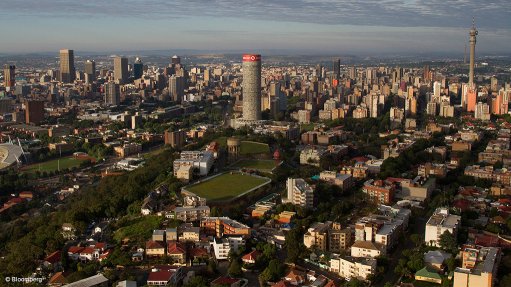
Johannesburg
Photo by: Bloomberg
City of Joburg executive mayor Herman Mashaba’s Inner City Rejuvenation Programme (ICRP) has, to date, awarded tenders for 24 developments, spanning 81 properties and pieces of land.
These developments are expected to create 11 000 direct jobs and will comprise around 6 500 one- and two-bedroom housing units, in addition to accommodation for 1 500 students.
The monthly rental price will range from R900 to R4 500 per unit a month, excluding utilities.
Upon releasing the first batch of properties for tender in the ICRP in October 2017, Mashaba specified that at least 20% of each development had to cater for the R900 per unit a month rental category.
The properties awarded as part of the 24 tenders have an investment value of about R20-billion and work on the developments by private developers will begin in the next six to eight months.
“Johannesburg is yet to come across a development of this size,” the mayor said during a media briefing on the sidelines of the Africa Construction Expo, in Midrand, on Tuesday.
All the ICRP tenders are intended to result in mixed-use developments, with an emphasis on affordable residential units, student accommodation and retail spaces for small businesses. The ICRP properties spanning the inner city include Johannesburg Central, Yeoville, Berea, Vrededorp, Fairview, Salisbury, Marshalltown, Wolhuter and Turffontein.
To date, the city council has approved 84 properties to be put up for tender. Mashaba said he was eagerly awaiting tenders for remaining properties in the current phase of the ICRP.
The deadline to submit these tenders is September.
The start of development on the ICRP properties comes at a crucial time, with the construction sector having lost 142 000 jobs during the first quarter of this year.
Mashaba said that South Africa, with its massive infrastructure backlog, could not afford to lose jobs in the construction sector.
“If that many people are without work in this crucial sector of the economy, that means we are not building the infrastructure we ought to be building to get our economy up and running again.”
Johannesburg alone has an infrastructure backlog of more than R170-billion, and 4 000 km of broken roads and 700 crumbling bridges, arising from an R18-billion backlog in the transport network.
Mashaba explained that a housing backlog of more than 300 000 units (in the city) had resulted in a legacy of land desperation and backyard dwellings.
Further, a R60-billion backlog in Johannesburg’s electricity network resulted in roughly 170 000 power outages each year, while a water network backlog of R18-billion caused about 45 000 leaks and, therefore, resulted in a loss of around 107-billion litres of water a year.
The City of Joburg has committed to raising the city’s economic growth rate to 5% by 2021 and the ICRP has been earmarked as a catalyst for achieving that goal.
Mashaba plans for the city to release about 100 buildings for tender each year, attracting investment of between R16-billion and R20-billion. The city has identified about 500 properties that need to be revitalised, as they have either been abandoned or highjacked.
Meanwhile, Mashaba on Tuesday said a multidisciplinary fast-track committee had been making inroads into creating an environment that simplified doing business in Johannesburg.
“Times for approving building plans, rezoning applications, applying for service connections and the like have begun to drop to record lows,” he highlighted.
“It is all about changing red tape into red carpet for our business community.”